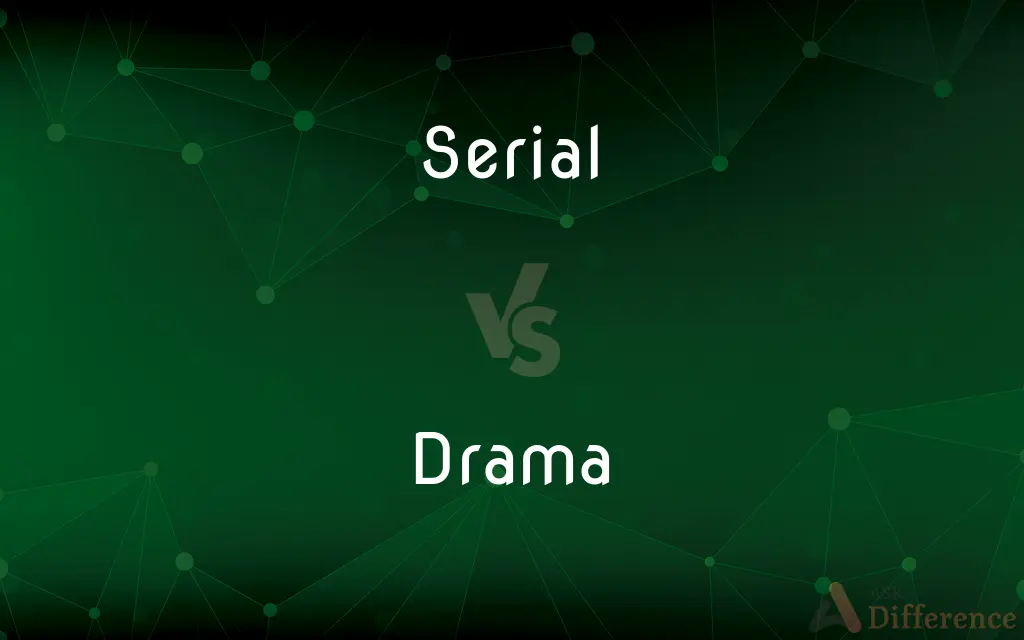Serial vs. Drama — What's the Difference?
By Maham Liaqat & Fiza Rafique — Updated on March 12, 2024
Serials unfold stories over multiple episodes, focusing on plot evolution, while dramas often present character-driven narratives within a single work or episode.

Difference Between Serial and Drama
Table of Contents
ADVERTISEMENT
Key Differences
Serials are characterized by their episodic nature, where the story extends over multiple episodes, allowing for detailed character development and complex plotlines. Viewers must follow each episode to understand the ongoing storyline. Whereas dramas, although they can also be serialized, typically emphasize character-driven narratives that focus on emotional and relational aspects, and can be self-contained in a single episode or work.
Serials often employ cliffhangers at the end of episodes to entice viewers to watch the next installment, creating a sense of anticipation and continuous engagement. On the other hand, dramas may conclude with a resolution of the main conflict within the same episode or work, providing a more immediate sense of closure.
The serialized format allows creators to explore subplots and develop characters more deeply, as there is more screen time available across the episodes. This contrasts with dramas, where the storytelling is more concentrated and every scene is crucial to the character development and narrative progression.
Serials cater to audiences looking for long-term engagement with a story and its characters, offering an evolving narrative that can adjust to viewer feedback and changing trends. Dramas, in contrast, appeal to those seeking a complete, often more intense emotional or thematic experience within a shorter timeframe.
While serials often span genres, including soap operas, thrillers, and science fiction, dramas focus more on the emotional and relational aspects, regardless of the setting or genre, highlighting the universal themes of human experience.
ADVERTISEMENT
Comparison Chart
Narrative Structure
Episodic, with a continuing story across episodes
Can be episodic or single-work, with a focus on emotional depth
Engagement
Long-term, requiring commitment to follow
Can be immediate, often resolved within a single episode or work
Plot Development
Extended, with complex subplots
Focused, with a central theme or conflict
Character Development
In-depth, evolving over time
Intense, often within a constrained timeframe
Typical Ending
Cliffhangers to encourage continuous viewing
Resolution of main conflict, providing closure
Compare with Definitions
Serial
Requires viewers to follow each episode to understand the evolving story.
Miss one episode of the serial, and you might lose track of the storyline.
Drama
Can offer a complete, intense emotional or thematic experience.
Last night's drama was a powerful exploration of redemption.
Serial
Often spans various genres, from soap operas to thrillers.
This serial blends science fiction with drama brilliantly.
Drama
Appeals to those seeking a quick, often more impactful emotional engagement.
Viewers praised the drama for its quick dive into complex emotions.
Serial
Allows for detailed character development and complex subplots.
The serial’s depth in character development is unmatched.
Drama
Storytelling is concentrated, with every scene crucial to narrative progression.
The drama’s tight storytelling left no room for filler.
Serial
A narrative format that unfolds over multiple episodes, often featuring cliffhangers.
The latest serial on TV has captivated audiences with its intricate plot.
Drama
Emphasizes character-driven narratives, often within a single work or episode.
The drama’s focus on family dynamics was deeply moving.
Serial
Caters to audiences looking for long-term engagement with a story.
Fans of the serial eagerly await each new episode every week.
Drama
Focuses on the emotional and relational aspects, regardless of setting.
The drama, set in outer space, explored the loneliness of existence.
Serial
Of, forming, or arranged in a series.
Drama
Drama is the specific mode of fiction represented in performance: a play, opera, mime, ballet, etc., performed in a theatre, or on radio or television. Considered as a genre of poetry in general, the dramatic mode has been contrasted with the epic and the lyrical modes ever since Aristotle's Poetics (c.
Serial
Published or produced in installments, as a novel or television drama.
Drama
A play for theatre, radio, or television
A gritty urban drama about growing up in Harlem
Serial
Relating to such publication or production.
Drama
An exciting, emotional, or unexpected event or circumstance
A hostage drama
An afternoon of high drama at Wembley
Serial
Relating to or engaging in a series of similar acts or behaviors
Serial arson.
A serial procrastinator.
Drama
A prose or verse composition, especially one telling a serious story, that is intended for representation by actors impersonating the characters and performing the dialogue and action.
Serial
(Music) Relating to or based on a row of tones, especially the 12 pitches of the chromatic scale.
Drama
A serious narrative work or program for television, radio, or the cinema.
Serial
Of or relating to the sequential transmission of all the bits of a byte over one wire
A serial port.
A serial printer.
Drama
Theatrical plays of a particular kind or period
Elizabethan drama.
Serial
Of or relating to the sequential performance of multiple operations
Serial processing.
Drama
The art or practice of writing or producing dramatic works.
Serial
A work of entertainment, as in film or literature, published or produced in installments that usually contain a narrative thread or overarching theme; a series.
Drama
A situation or succession of events in real life having the dramatic progression or emotional effect characteristic of a play
The drama of the prisoner's escape and recapture.
Serial
Having to do with or arranged in a series.
Drama
The quality or condition of being dramatic
A summit meeting full of drama.
Serial
(of a person) Who performs a specified action or course of action repeatedly or regularly.
The serial killer had a string of victims across seven states.
He was a serial entrepreneur, always coming up with a new way to make cash.
Drama
A composition, normally in prose, telling a story and intended to be represented by actors impersonating the characters and speaking the dialogue
The author released her latest drama, which became a best-seller.
Serial
Published or produced in installments.
Drama
Such a work for television, radio or the cinema (usually one that is not a comedy)
Serial
(grammar) Of or relating to a grammatical aspect relating to an action that is habitual and ongoing.
Drama
Theatrical plays in general
Serial
A work, such as a work of fiction, published in installments, often numbered and without a specified end.
Drama
A situation in real life that has the characteristics of such a theatrical play
After losing my job, having a car crash, and the big row with my neighbours, I don't need any more drama.
Serial
A publication issued in successive parts, often numbered and with no predetermined end.
Drama
(slang) Rumor, lying or exaggerated reaction to life or online events; melodrama; an angry dispute or scene; a situation made more complicated or worse than it should be; intrigue or spiteful interpersonal maneuvering.
Serial
A serial number, esp. one required to activate software.
Go to these sites for serials, cracks and keygens.
Drama
A composition, in prose or poetry, accommodated to action, and intended to exhibit a picture of human life, or to depict a series of grave or humorous actions of more than ordinary interest, tending toward some striking result. It is commonly designed to be spoken and represented by actors on the stage.
A divine pastoral drama in the Song of Solomon.
Serial
(UK) A unit of police officers equipped with shields to tackle a riot.
Drama
A series of real events invested with a dramatic unity and interest.
Westward the course of empire takes its way;The four first acts already past,A fifth shall close the drama with the day;Time's noblest offspring is the last.
The drama and contrivances of God's providence.
Serial
(transitive) to assign a serial number to (especially of aircraft)
Drama
Dramatic composition and the literature pertaining to or illustrating it; dramatic literature.
Serial
Of or pertaining to a series; consisting of a series; appearing in successive parts or numbers; as, a serial work or publication.
Drama
A dramatic work intended for performance by actors on a stage;
He wrote several plays but only one was produced on Broadway
Serial
Of or pertaining to rows.
Drama
An episode that is turbulent or highly emotional
Serial
A publication appearing in a series or succession of part; a tale, or other writing, published in successive numbers of a periodical.
Drama
The literary genre of works intended for the theater
Serial
A serialized set of programs;
A comedy series
The Masterworks concert series
Drama
The quality of being arresting or highly emotional
Serial
A periodical that appears at scheduled times
Serial
In regular succession without gaps;
Serial concerts
Serial
Pertaining to or composed in serial technique;
Serial music
Serial
Pertaining to or occurring in or producing a series;
Serial monogamy
Serial killing
A serial killer
Serial publication
Serial
Of or relating to the sequential performance of multiple operations;
Serial processing
Common Curiosities
How does a drama differ in narrative structure from a serial?
Dramas can be self-contained within a single episode or work, focusing more on emotional depth, unlike the continuing narrative of serials.
Can dramas offer closure within a single episode?
Yes, dramas often provide resolution and closure within the same episode or work.
What defines a serial?
A serial is defined by its episodic format, extending a single story across multiple episodes.
Can a drama be serialized?
Yes, a drama can be serialized, presenting character-driven stories across multiple episodes while maintaining a focus on emotional and relational themes.
Why might someone prefer a serial over a drama?
Viewers looking for long-term engagement with evolving narratives and characters might prefer serials.
What role do subplots play in serials?
Subplots in serials enrich the main narrative, adding complexity and depth to the story and characters.
Why do serials use cliffhangers?
Serials use cliffhangers to create anticipation and ensure viewers return for the next episode.
What type of character development is typical in a serial?
Serials often feature in-depth character development, evolving over many episodes.
What is the appeal of a drama?
Dramas appeal to those seeking an intense emotional or thematic experience, often within a shorter timeframe.
How do plot developments differ between serials and dramas?
Serials feature extended plot developments with complex subplots, while dramas focus on a central theme or conflict.
How does audience engagement differ between serials and dramas?
Serials require long-term commitment, whereas dramas can engage audiences immediately and intensely.
Is emotional depth exclusive to dramas?
While dramas emphasize emotional depth, serialized dramas can also explore complex emotional landscapes over time.
What genres can serials span?
Serials can span a wide range of genres, including soap operas, thrillers, and science fiction.
What makes drama storytelling concentrated?
Drama storytelling is concentrated due to its focus on crucial scenes that drive character development and narrative progression.
Can a drama be both serialized and emotionally intense?
Yes, serialized dramas combine the episodic structure of serials with the emotional intensity typical of drama narratives.
Share Your Discovery

Previous Comparison
Brandy vs. Sherry
Next Comparison
Persecution vs. TribulationAuthor Spotlight
Written by
Maham LiaqatCo-written by
Fiza RafiqueFiza Rafique is a skilled content writer at AskDifference.com, where she meticulously refines and enhances written pieces. Drawing from her vast editorial expertise, Fiza ensures clarity, accuracy, and precision in every article. Passionate about language, she continually seeks to elevate the quality of content for readers worldwide.
















































